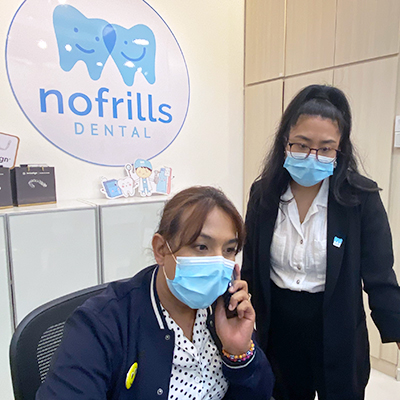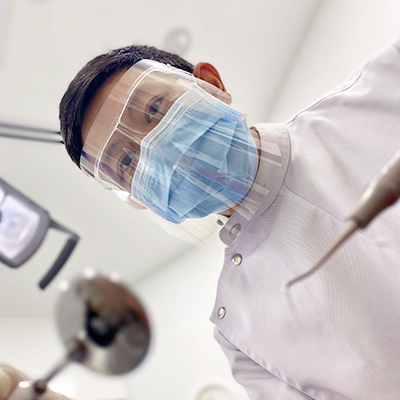Veneers
Dental veneers, also known as laminates, are custom-designed shell-like ceramic porcelain that are used to cover your teeth surfaces, giving you a natural-looking and radiant smile. Porcelain veneers consist of a thin layer of restorative material that is placed over a tooth surface. They are effective alternatives to treatments like crowns, bridges and implants. Dental veneers provide strong and lasting solutions for those with gapped, discoloured, chipped or uneven teeth. They generally have a longer life expectancy and colour stability than bonding and can provide resistance against staining from coffee, tea and tobacco use.
Veneers are usually fitted across two visits and can last about 10-15 years after which it will require replacement. During your first visit, our dentist will first examine your teeth to access if veneers are appropriate for your teeth. For example, veneers are generally not suitable for people who grind their teeth or have extensive tooth decay or has a weak structure. During preparation for the tooth, a local anaesthetic may be given to ensure the treatment is painless. In order to place the veneer onto your tooth, some enamel will be removed from the tooth surface to ensure the veneer can be bonded to the tooth comfortably. The tooth shape is modified and an impression is taken of the tooth.
A temporary veneer will be applied while the tooth impression is sent to the laboratory for veneer fabrication. At the final visit for bonding treatment, the veneer is checked for fit and colour before being permanently bonded to the tooth using special light activated adhesives. Once veneers are bonded into place, they are relatively strong and durable. However, care must be taken because the thin porcelain shells can damage or break.
The problems that may be corrected with a dental veneer include:
- Gaps in your teeth
- Unsightly discoloration on one or more teeth
- A tooth that is crooked
- A tooth that is misshaped
- Severe staining on your teeth
- Chipped teeth
- Broken teeth
Benefits of Dental Veneers
Dental veneers are regularly used to achieve the perfect smile. Some of us have small teeth, resulting in spaces that cannot be easily closed using braces or discoloured teeth that resist whitening. Others may have worn away the edges of their teeth or suffer from conditions that cause erosion of the enamel of their teeth, resulting in a prematurely aged appearance.
Multiple veneers can mask these spaces, restore teeth height that have been shortened by wear, protect teeth from further erosion, fill small black triangles between teeth caused by gum recession, improve colour, shape, and symmetry, and make the teeth appear straight.
Treatment Process
Communication with the dentist about your concerns and exploring alternate solutions is essential for a successful outcome. Each smile is different and veneers need to be carefully prescribed. Our dentist will start with a smile analysis to determine the steps that are necessary to achieve the smile that you desire. Thereafter, he may carry out a diagnostic mock-up or show you a simulation of your new smile.
Porcelain veneers consist of a thin ceramic shell (which replace tooth enamel), and an adhesive layer that bonds it to natural tooth. A small amount of the original tooth enamel must be removed, usually less than a millimetre, to create room for the porcelain veneer. An impression of the preparation is taken and sent to the dental laboratory for veneer fabrication. Once ready, the veneer is fitted in place using light-sensitive resin based adhesives.
The procedure for composite veneers is slightly different as the veneer material is applied directly onto the prepared tooth surface, sculpted to its desired shape and hardened using a curing light.
FAQs on Dental Veneers
1. How long will it take?
The procedure can often be completed within two visits. The time taken for teeth preparation and fitting is dependent on the number of teeth being treated.
2. What will the experience be like?
Teeth preparation is usually done under local anaesthetic to minimise discomfort. You should expect transient sensitivity to hot and cold temperature in between visits and immediately after the fitting appointment. This is due to the removal of that thin layer of enamel and typically resolves within a few days.
Dental veneers are strong enough to withstand normal chewing forces and you can expect to use them like your own teeth. Like glass, they are also brittle and you should avoid the same excessive stresses you would avoid with natural teeth (such as do not bite your fingernails, chew ice, or use them to open beer bottles!)
3. How do I decide on the type of dental veneers?
Dental veneers can be made from composite, ceramic or porcelain. A composite veneer can be built-up in the mouth or indirectly fabricated in a dental laboratory. In contrast, a ceramic or porcelain veneer may only be indirectly fabricated.
Porcelain veneers
Porcelain veneers are more durable, have excellent aesthetics and stain resistance compared to composites. It has a glass like property and can be sculpted, making it very difficult to tell the difference between a porcelain veneer and a natural tooth.
Composite
Composite veneers can be fabricated in a single visit and are generally more affordable. It is however more prone to staining and leakage compared to porcelain veneers.
‘Prepless’ or ‘Minimal prep’ ceramic veneers
Some dental laboratories/manufacturers are able to fabricate very thin ceramic veneers that reduce the amount of tooth structure removal. These types of veneers are more conservative and reduce the incidence of teeth sensitivity, albeit more expensive. They have their own disadvantages and may not be suitable for everyone.
4. Are there any risks?
You should always weigh the advantages and disadvantages of dental veneers carefully as your dentist may need to remove between 0.3mm and 0.8 mm of enamel to accommodate the thickness of the dental veneers.
Dental veneers need to be diligently maintained with good personal oral hygiene and professional oral care. Failure to do so may lead to premature failure due to decay or gum disease affecting the margins of the veneers. Another common problem is veneer fracture due to normal function, grinding habits or mishaps. This can be mitigated to a certain extent with the use of a night guard when sleeping.
Today, with improved resin based adhesives, dental veneers can last an average of between 5 and 10 years. Some studies suggest that approximately 50% of dental veneers will have to be replaced at the tenth year anniversary due to porcelain fracture, leakage, discolouration, decay or shrinkage of the gum line.
The use of dental veneers to simulate straight teeth, commonly referred to as ‘instant orthodontics’, in young patients with healthy teeth is not recommended. The long term maintenance needed and potential need for irreversible teeth preparation is simply not worth the time saved from undergoing routine braces treatment.
Dental Services
Book an Appointment!

CHAS & Medisave Accredited Clinics
NoFrills Dental clinics in Singapore participate in Merdeka Generation, Pioneer Generation, CHAS Card and Medisave programs.

Flexible Payment Options Available
Contact us to know more about the versatile & flexible payment options offered at NoFrills Dental clinics.

Opening Hours
Monday - Friday: 10am to 7pm
Saturday: 10am to 5pm
Sunday & Public Holiday: Closed

Book an Appointment
NoFrills Dental offers a wide variety of high-quality dental services. Talk to us to book your next dental appointment with us.

